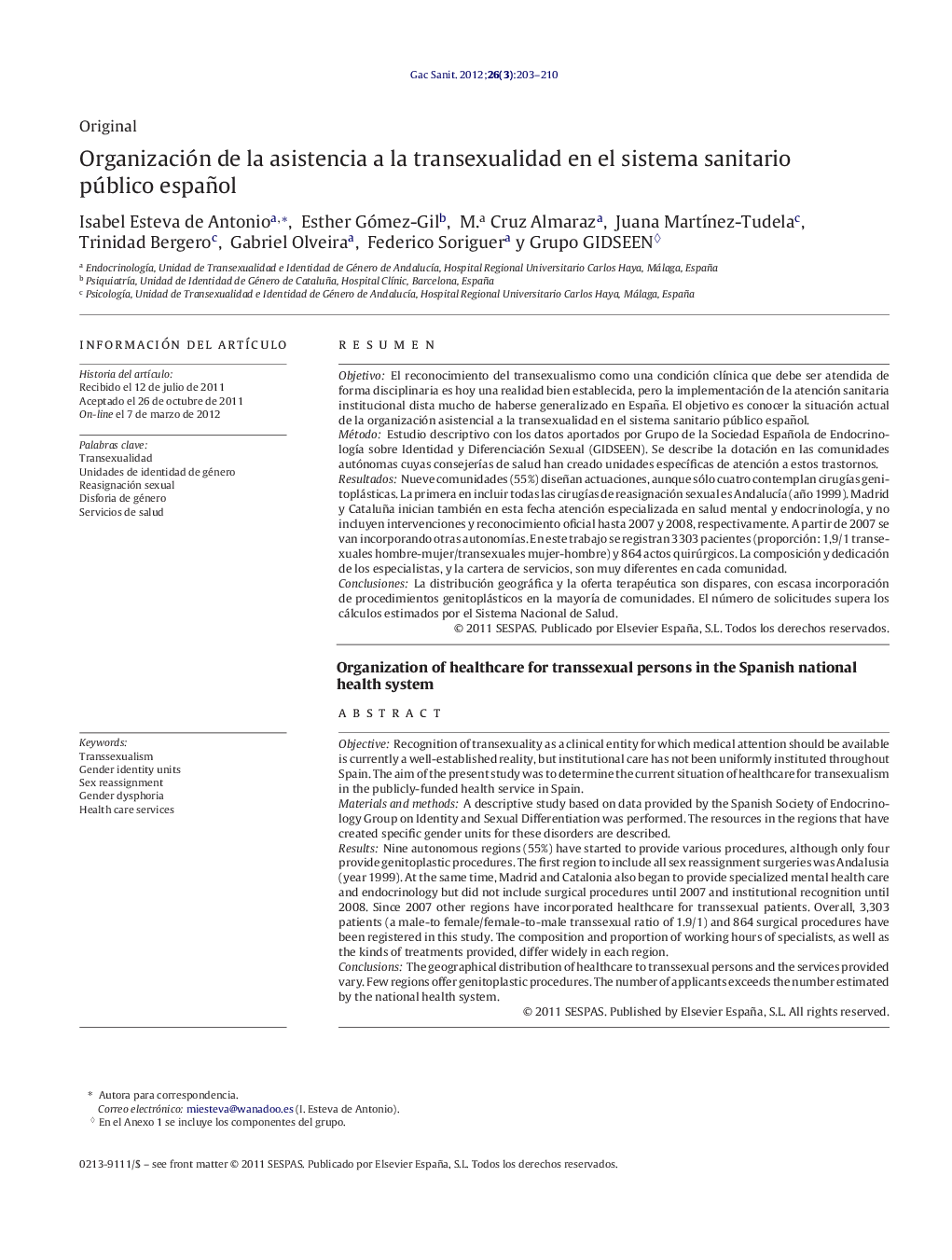| Article ID | Journal | Published Year | Pages | File Type |
|---|---|---|---|---|
| 1073696 | Gaceta Sanitaria | 2012 | 7 Pages |
ResumenObjetivoEl reconocimiento del transexualismo como una condición clínica que debe ser atendida de forma disciplinaria es hoy una realidad bien establecida, pero la implementación de la atención sanitaria institucional dista mucho de haberse generalizado en España. El objetivo es conocer la situación actual de la organización asistencial a la transexualidad en el sistema sanitario público español.MétodoEstudio descriptivo con los datos aportados por Grupo de la Sociedad Española de Endocrinología sobre Identidad y Diferenciación Sexual (GIDSEEN). Se describe la dotación en las comunidades autónomas cuyas consejerías de salud han creado unidades específicas de atención a estos trastornos.ResultadosNueve comunidades (55%) diseñan actuaciones, aunque sólo cuatro contemplan cirugías genitoplásticas. La primera en incluir todas las cirugías de reasignación sexual es Andalucía (año 1999). Madrid y Cataluña inician también en esta fecha atención especializada en salud mental y endocrinología, y no incluyen intervenciones y reconocimiento oficial hasta 2007 y 2008, respectivamente. A partir de 2007 se van incorporando otras autonomías. En este trabajo se registran 3303 pacientes (proporción: 1,9/1 transexuales hombre-mujer/transexuales mujer-hombre) y 864 actos quirúrgicos. La composición y dedicación de los especialistas, y la cartera de servicios, son muy diferentes en cada comunidad.ConclusionesLa distribución geográfica y la oferta terapéutica son dispares, con escasa incorporación de procedimientos genitoplásticos en la mayoría de comunidades. El número de solicitudes supera los cálculos estimados por el Sistema Nacional de Salud.
ObjectiveRecognition of transexuality as a clinical entity for which medical attention should be available is currently a well-established reality, but institutional care has not been uniformly instituted throughout Spain. The aim of the present study was to determine the current situation of healthcare for transexualism in the publicly-funded health service in Spain.Materials and methodsA descriptive study based on data provided by the Spanish Society of Endocrinology Group on Identity and Sexual Differentiation was performed. The resources in the regions that have created specific gender units for these disorders are described.ResultsNine autonomous regions (55%) have started to provide various procedures, although only four provide genitoplastic procedures. The first region to include all sex reassignment surgeries was Andalusia (year 1999). At the same time, Madrid and Catalonia also began to provide specialized mental health care and endocrinology but did not include surgical procedures until 2007 and institutional recognition until 2008. Since 2007 other regions have incorporated healthcare for transsexual patients. Overall, 3,303 patients (a male-to female/female-to-male transsexual ratio of 1.9/1) and 864 surgical procedures have been registered in this study. The composition and proportion of working hours of specialists, as well as the kinds of treatments provided, differ widely in each region.ConclusionsThe geographical distribution of healthcare to transsexual persons and the services provided vary. Few regions offer genitoplastic procedures. The number of applicants exceeds the number estimated by the national health system.
